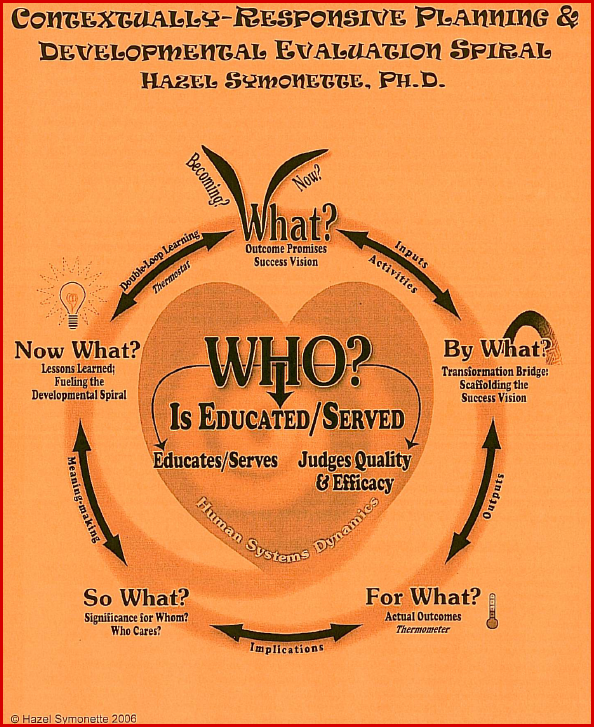Hello, we’re Dominica McBride and Leah Neubauer, members of the AEA Public Statement on Cultural Competence Dissemination Working Group. At AEA 2012, we participated in the brownbag session Critically Reflecting and Thinking about Cultural Competence in Your Evaluation Practice. We’d like to share some of the great insights generated from this session.
In this session, we learned about a nursing student who, influenced by Western Medicine cultural ideologies of time- and task-orientation and protocol, misdiagnosed a patient due to a lack of cultural sensitivity and critical self-awareness. We also learned about a comprehensive model of self-reflection from Hazel Symonette that encompasses internal, external/other, space, and time. Below are several lessons learned:
Lessons Learned
Our sense of time can affect how we do our evaluations and the use and impact of our evaluations.In the case study of the nursing student, she quickly ran through her nursing duties, completing an assessment and diagnosis in under 5 minutes. This rush caused a missed opportunity to gain more insight and the patient was misdiagnosed. We, as evaluators, can do this same thing. If operating in a mental frame of “getting stuff done” and “getting it done fast”, we miss opportunities to collect valuable data and gain additional insight. We also miss the opportunity to be more self-reflective. Without this introspection, we may, like the nursing student, “misdiagnose” or misinterpret the situation and data.
We too often assume that we know.Even in the midst of data collection and trying to be objective, we can often assume that we know something or have an accurate interpretation when we actually do not. In Love’s Executioner, Irvin Yolam, a reputable psychiatrist, talks about how communication is filtered through our experiences, biases, feelings, etc. We never fully accurately know what the other is communicating. However, with self-reflection and dialogue, we can check to see if we’re interpreting correctly. We create spaces to gain other perspectives accurately, thus enriching our interpretations and leading to accurate and comprehensive work.
We strive for perfection – is perfection possible? In Becoming a Critically Reflective Teacher, Dr. Stephen D. Brookfield discusses teaching culture that strives for the ‘perfect 10’ in their teaching. A critically-reflective state of practice acknowledges a constant state of knowing and learning more.
One lesson harkens back to a lesson from Spiderman – With great power comes great responsibility. As evaluators, our judgments are seen as mattering more than some others. We have a special responsibility to ensure that findings and conclusions are inclusive, public, and shared.
Hazel Symonette developed a comprehensive model for self-reflection we can easily incorporate into evaluation and daily life.
Stephen D. Brookfield has written extensively on the role of critical self-reflection for adult educators.
This week, we’re diving into issues of Cultural Competence in Evaluation with AEA’s Statement on Cultural Competence in Evaluation Dissemination Working Group. Do you have questions, concerns, kudos, or content to extend this aea365 contribution? Please add them in the comments section for this post on the aea365 webpage so that we may enrich our community of practice. Would you like to submit an aea365 Tip? Please send a note of interest to aea365@eval.org. aea365 is sponsored by the American Evaluation Association and provides a Tip-a-Day by and for evaluators.


This was another one of my favorite AEA conference sessions on Cultural Competence in Evaluation.
Dr. Symonette’s dynamic words, noting how we as evaluators should look and see, listen and hear, touch and feel will always resonate with me in my evaluation practice.